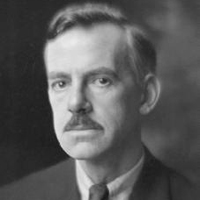Symbolism in Desire Under the Elms
Eugene O'Neill has made an extensive use of symbols in his play Desire Under the Elms, so as to cater the implicit meaning of the play. The symbols of maternal and paternal forces are enormous elm tree and stone wall respectively. The Cabot farm - house, is a sickly grayish stone color of the house stands for somber, hard Puritanism and the green of the elms for the vegetative, life affirming forces, denied in the Cabot house since the death of Eben's mother: the green of the shutters is faded.

Eugene O'Neill (1888- 1953)
The sky above the roof is covered with deep color, the green of the elms glows, but the house is in shadow, seeming pale and washed out by contrast. The most direct human counterpart of the elms, we find in Ephraim's two former wives, who must indeed have been exhausted women with sagging breasts, weeping tears which would trickle down monotonously from their sad eyes. This is true especially of the second wife, Eben's mother, whom Ephraim made work to death and whose eyes used to be weeping and bloody with smoke and cinders. It is Eben, who tells us this. We know that he hates his father.
The elms, which is another vital symbol, seem to signify both the dead woman herself, her original, healthy life and the wrong done to her. It further stands for both nature and the thwarting of nature, both her unselfish love and the Cabot's loveless-ness towards her. Above all, the enormous tree seems to represent their guilt which has been growing ever since she dies and sucking the blood from the pale house below; thus, the Puritan concern with the past sins leaves the Cabots less than living.
Nature stands as a symbol in the play. "Nature'll beat ye", Abbie says, and this is precisely what happens. It is not so much that Eben succumbs to Abbie's or his own sexual desire, for it is made quite clear that he does not accept her until she has become identified in his mind with the mother. Only when he sees Abbie, not as a rival of the mother, but as her tool of vengeance on Ephraim, can he give free rein to his desire. Yet since the mother represents nature - gradually - thwarted - by - life -denying Puritanism, Abbie's seduction of Eben, indicating how nature triumphs over puritanism is clearly a retributive act. It is in this sense that nature beats him. When Abbie compares their sexual desire to the growth of the elm tree it is as natural and powerful she draws attention to the trees as symbols of nature, the nature that is suppressed by Cabot (as dead woman was suppressed) and therefore has grown enormous and revengeful and soon will bust.
Nature saddened by Puritanism is another significant symbol of the play. The elms represent, above all, nature and obliquely, nature thwarted by intimate contact with Puritanism (the house). All the women in the play: Jenny's long hair as compared to the hair - like trailing branches and Minnie's resemblances to a fruitful Earth Mother - and especially the dead women and Abbie are basically in harmony with nature and therefore resemble the elms. Although nature has been suppressed, it can't remain so for long: finally it takes its revenge on its oppressors: hence the elms come to represent as brooding and ultimately triumphant fate, which operates from without through one of the allies of nature - Abbie - and from within through an accumulating guilt demanding atonement.
This stove and the money hidden under it, are minor symbols the playwright has used. Under the stove, Ephraim has hidden the money he had hoarded from the farm that by rights belonged to Eben's mother; the mother had discovered the hiding-place and told Eben about it. Eben's feeling that the mother is unable to find peace in the grave and stand by the stove every evening is undoubtedly related to the treasure hidden underneath it. Psychologically, we may interpret theses hallucinatory experiences as self-reproaches: Eben is painfully aware that both the hidden money and the farm are still Ephraim's that he has not revenged the mother.
There is symbolic significance of eating and drinking in Desire Under the Elms. Such everyday occupations as eating, smoking, and drinking all have their special connotations in O'Neill's play. Eben, although he does all the cooking in the house, keeps picking at his food without appetite. His brothers Simeon and Peter, and his antithesis when they hear Eben calling that supper is ready, their beast - like characteristics are at once revealed. Simeon smacks his lips and says he is hungry. Peter smells bacon, and they both expect to enjoy eating bacon. A little later we see the two eating as naturally unrestrained as beasts of the field while Eben glances at them with a tolerant dislike. Simeon and Peter are of the view that mew should eat flesh and drink wine (and they later get drunk on whisky) while life lasts. They have thus a simple, animalistic view of life. Eben's desire, as his attitude to food indicates, is not of this primitive Order.
O'Neill uses the land itself as a symbol. The land stands for wealth. Many characters are tied to the land and it is their lust for that land which had made their life problematic. Cabot married Eben's mother for the land and Abbie came to the farm because of her lust for it. Her sexual contact with Eben can also be explained on the similar grounds.
Desire Under the Elms Study Center
Introduction of Desire Under the Elms
Summary of Desire Under the Elms
O'Neill's Style in Desire Under the Elms
Image of Women in Desire Under the Elms
The Themes in Desire Under the Elms
A Conflict of the Dionysian and Apollonian Forces
Dramatic Technique in Desire Under the Elms
 |
bachelorandmaster.com |